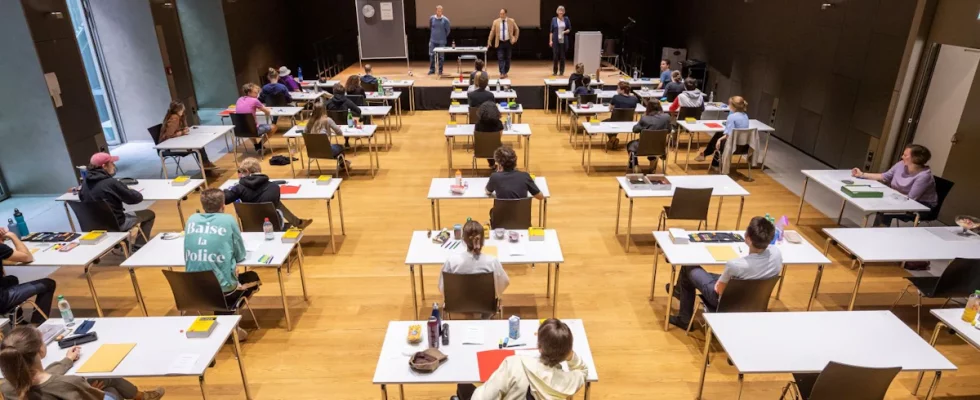German and mathematics as written exams are compulsory in the G-8 Abitur, so on Thursday morning all 34,000 young people in the graduating classes at Bavarian high schools had to think about which topic they wanted or had to work on for the next five hours and 15 minutes.
In order to achieve a certain comparability of the Abitur and common educational standards in Germany, the education ministries of the federal states must select half of their tasks from the so-called pool. That’s why prospective high school graduates all over Germany wrote their German exam at the same time on Thursday. Pool tasks are also available for mathematics, English and French.
The following tasks were up for election in Bavaria this year:
Task I (Interpreting a literary text)
a) Interpret the poem traveling in the fog by Jan Wagner! approx. 70%
b) Based on your results, show comparatively how the perceptions during a car journey in Jan Wagner’s poem traveling in the fog and in the excerpt from Max Frisch’s novel Homo faber be designed! In addition to the content, you should also take selected linguistic and formal aspects into account! approx. 30%
Preliminary remark: The center of the novel is the life of the Swiss engineer Walter Faber. In the present excerpt he is in the mid-1950s, accompanied by the American Marcel, whom he recently met and who spontaneously accompanied him on a trip to Guatemala, on the way back to Mexico and from there to the east coast of the USA fly.
Task II (Interpreting a literary text)
a) Interpret this excerpt from Georg Büchner’s drama Leonce and Lena! approx. 70%
b) Based on your results, show how the end of a relationship is shaped in another literary work! approx. 30%
Preliminary remark: The focus of the comedy in three acts is the connection between Prince Leonce and Princess Lena, which was arranged by Leonce’s father. While the court waits for the prince’s fiancée to arrive, Leonce meets with his lover Rosetta. The following excerpt shows Rosetta’s only appearance in the play; Princess Lena only appears for the first time after this scene. This text is the beginning of the third scene in the first act.
Task III (Interpreting a literary text)
a) Interpret the beginning of Arthur Schnitzler’s story A goodbye! In particular, explain how the text reflects upheavals in literature around 1900 both thematically and through its form of storytelling! approx. 80%
b) Based on your results, show comparatively how the dependency relationship between two characters is designed in another literary work! approx. 20%
Task IV (Analyzing a pragmatic text)
a) Analyze Gustav Seibt’s text! Take into account the argument, the linguistic and stylistic design and the intentions of the text! approx. 70%
b) Deal with Seibt’s position on framing as an element of public opinion formation in the media! approx. 30%
Preliminary remark: Gustav Seibt (born 1959) is a German literary critic, essayist and historian. The text “Sire, give freedom of expression!” appeared on March 23, 2019 in the Süddeutsche Zeitung.
:The knowledgeable and the dawning masses
“Challenge” instead of “problem”, “financial participation” instead of “compulsory fee”: Are we allowing ourselves to be manipulated by linguistic maneuvers?
Task V (material-based writing of an argumentative text)
Edit one of the two variants!
Version 1:
Discuss the opportunities and problems of the fact that nowadays every user on the Internet can publish reviews of literary works! Please take into account the attached materials and incorporate your knowledge and your own experiences!
Variant 2:
Against the backdrop of the Frankfurt Book Fair, a renowned literary publisher has announced an essay competition for school students on the topic of “Literature in the Digital Age”. To do this, write an essay that deals with the fact that nowadays every user on the Internet can publish reviews of literary works!
To do this, use the materials M1 to M6 and incorporate your knowledge and your own experiences!
(Editor’s note: Attached are a caricature by Karsten Schley, the Wikipedia definition of “review”, an interview by the NDR with the German scholar Ernst Osterkamp, a contribution by the literary critic Thomas Anz and a text by the critic Insa Wilke in the “Zeit” as well as a contribution by the NDR -Journalist Jürgen Deppe.)
Your essay should be approximately 1200 words. Formulate a suitable headline! Quotations from the materials are given in accordance with the style of an essay without a line, only naming the author and, if necessary, the title.
Would you have known?
The next Abitur exams will take place on Friday, May 3rd. Then the natural and social science subjects as well as all foreign languages except French are up for written examination. Mathematics follows as the last written exam on May 7th, after which the 34,000 young people go to the colloquia. This year, Bavarian high school graduates will receive their certificates on June 28th.

